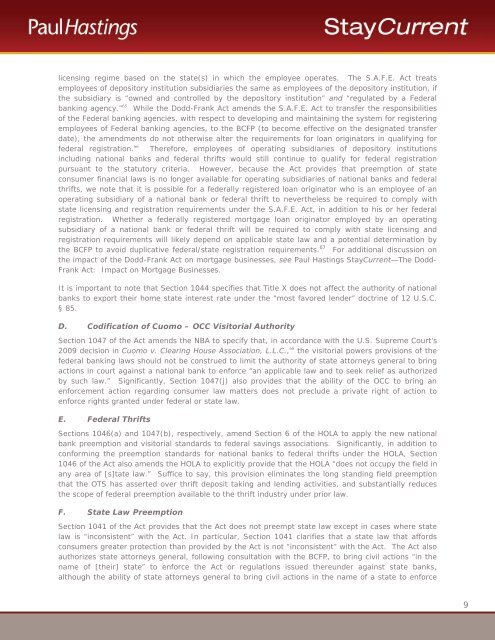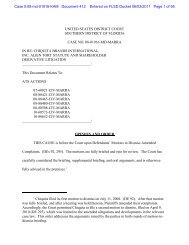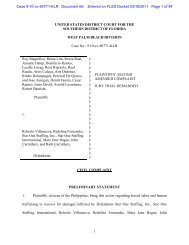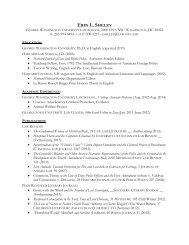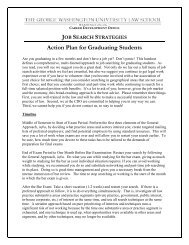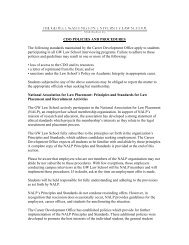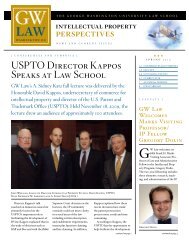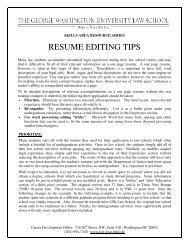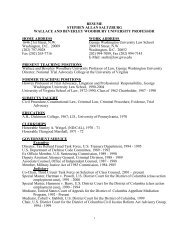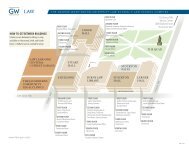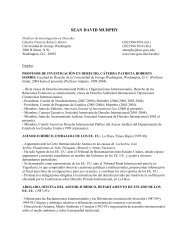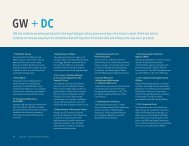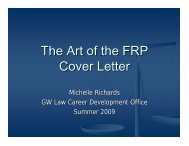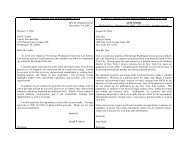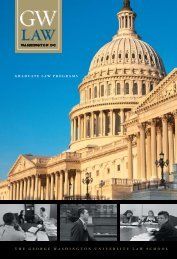CLE Materials for Panel #1 - George Washington University Law ...
CLE Materials for Panel #1 - George Washington University Law ...
CLE Materials for Panel #1 - George Washington University Law ...
You also want an ePaper? Increase the reach of your titles
YUMPU automatically turns print PDFs into web optimized ePapers that Google loves.
licensing regime based on the state(s) in which the employee operates. The S.A.F.E. Act treats<br />
employees of depository institution subsidiaries the same as employees of the depository institution, if<br />
the subsidiary is “owned and controlled by the depository institution” and “regulated by a Federal<br />
banking agency.” 65 While the Dodd-Frank Act amends the S.A.F.E. Act to transfer the responsibilities<br />
of the Federal banking agencies, with respect to developing and maintaining the system <strong>for</strong> registering<br />
employees of Federal banking agencies, to the BCFP (to become effective on the designated transfer<br />
date), the amendments do not otherwise alter the requirements <strong>for</strong> loan originators in qualifying <strong>for</strong><br />
federal registration. 66 There<strong>for</strong>e, employees of operating subsidiaries of depository institutions<br />
including national banks and federal thrifts would still continue to qualify <strong>for</strong> federal registration<br />
pursuant to the statutory criteria. However, because the Act provides that preemption of state<br />
consumer financial laws is no longer available <strong>for</strong> operating subsidiaries of national banks and federal<br />
thrifts, we note that it is possible <strong>for</strong> a federally registered loan originator who is an employee of an<br />
operating subsidiary of a national bank or federal thrift to nevertheless be required to comply with<br />
state licensing and registration requirements under the S.A.F.E. Act, in addition to his or her federal<br />
registration. Whether a federally registered mortgage loan originator employed by an operating<br />
subsidiary of a national bank or federal thrift will be required to comply with state licensing and<br />
registration requirements will likely depend on applicable state law and a potential determination by<br />
the BCFP to avoid duplicative federal/state registration requirements. 67 For additional discussion on<br />
the impact of the Dodd-Frank Act on mortgage businesses, see Paul Hastings StayCurrent—The Dodd-<br />
Frank Act: Impact on Mortgage Businesses.<br />
It is important to note that Section 1044 specifies that Title X does not affect the authority of national<br />
banks to export their home state interest rate under the “most favored lender” doctrine of 12 U.S.C.<br />
§ 85.<br />
D. Codification of Cuomo – OCC Visitorial Authority<br />
Section 1047 of the Act amends the NBA to specify that, in accordance with the U.S. Supreme Court’s<br />
2009 decision in Cuomo v. Clearing House Association, L.L.C., 68 the visitorial powers provisions of the<br />
federal banking laws should not be construed to limit the authority of state attorneys general to bring<br />
actions in court against a national bank to en<strong>for</strong>ce “an applicable law and to seek relief as authorized<br />
by such law.” Significantly, Section 1047(j) also provides that the ability of the OCC to bring an<br />
en<strong>for</strong>cement action regarding consumer law matters does not preclude a private right of action to<br />
en<strong>for</strong>ce rights granted under federal or state law.<br />
E. Federal Thrifts<br />
Sections 1046(a) and 1047(b), respectively, amend Section 6 of the HOLA to apply the new national<br />
bank preemption and visitorial standards to federal savings associations. Significantly, in addition to<br />
con<strong>for</strong>ming the preemption standards <strong>for</strong> national banks to federal thrifts under the HOLA, Section<br />
1046 of the Act also amends the HOLA to explicitly provide that the HOLA “does not occupy the field in<br />
any area of [s]tate law.” Suffice to say, this provision eliminates the long standing field preemption<br />
that the OTS has asserted over thrift deposit taking and lending activities, and substantially reduces<br />
the scope of federal preemption available to the thrift industry under prior law.<br />
F. State <strong>Law</strong> Preemption<br />
Section 1041 of the Act provides that the Act does not preempt state law except in cases where state<br />
law is “inconsistent” with the Act. In particular, Section 1041 clarifies that a state law that af<strong>for</strong>ds<br />
consumers greater protection than provided by the Act is not “inconsistent” with the Act. The Act also<br />
authorizes state attorneys general, following consultation with the BCFP, to bring civil actions “in the<br />
name of [their] state” to en<strong>for</strong>ce the Act or regulations issued thereunder against state banks,<br />
although the ability of state attorneys general to bring civil actions in the name of a state to en<strong>for</strong>ce<br />
9<br />
9


